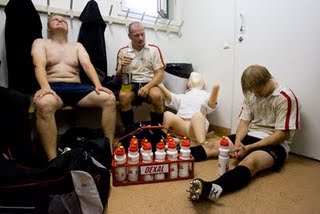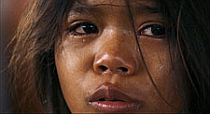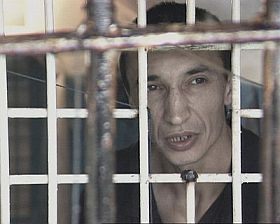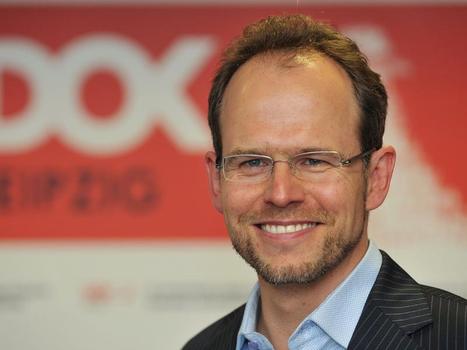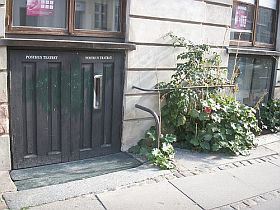Claas Danielsen is festival director of DOKLeipzig. His opening speech of this year’s festival is a high quality personal hommage to the documentary and to an audience that by public television is increasingly being treated as ignorant and unintelligent. Read his speech:
Welcome to the 52nd International Leipzig Festival for Documentary and Animated Film. What do you see, ladies and gentlemen? You see a large cinema, many red seats, lots of people. You see a screen and on the screen you see me. How do you see me? Small, from the distance, standing behind a speaker’s desk. And at the same time big, possibly in close-up, on the screen. I wear a suit, even a tie, to commemorate this special occasion. I seem focused, sometimes I smile. But do you really see how I feel? Those who know me a bit better may see that I am exhausted from the months of preparations for this festival.
What most of you cannot see is that I’m truly worried, worried about our colleague Matthias Heeder, a member of our selecting committee and the curator of this year’s special programme “T.I.A. – This Is Africa”. He is shooting a film in Sudan with his team and has not contacted us for days. We are waiting for a sign of life and thinking of him in the meantime.
What kind of face do I show you? What do we reveal about ourselves? My suit is, at least in Germany, appropriate for the occasion. I comply with social conventions but reveal very little of my true self. A part of me is sad. My father will celebrate his 80th birthday tomorrow and I won’t be able to be with him. Mentioning this here is really beside the point. Mentioning that I’m worried about him; that I fear he may die soon and will then regret having worked so much instead of spending more time with him, is a very private matter. I had better keep this to myself, hadn’t I?
But why, actually? I imagine that some of you may be thinking right now, “When was the last time that I went to see my father or my mother?” Or: “Why am I sitting in this cinema instead of spending time with my wife and our kids?”. Perhaps you are also thinking of the daily stress of professional life, about how time flies past and how little space you have reserved for yourself and the people that are important to you. Because life is finite. Beyond that we are faced with the question of what is essential.
During the past few weeks, many journalists have asked me what is special about documentary film. Documentary films are constantly surprising. I discover the unknown or re-discover seemingly familiar things through the filmmaker’s eyes. Documentary films often tackle uncomfortable, suppressed issues and go straight for the core.
The filmmaker’s attitude allows me to change my perspective, get a fresh look at the world. A really good film is marked by an attitude that I recognise in the choice of protagonists, in the images, words, sounds, rhythm, even in the elisions. This subjective and authentic attitude reveals the filmmaker, just as the protagonists are revealed in front of the camera. Of course it makes them vulnerable, too – precisely because they reveal themselves.
A good film opens up a space – a space for reflection, for association, for understanding, for finding meaning. It does not explain everything, has the courage to leave gaps, has no qualms about being irritating and thus ultimately brings me the gift of intellectual freedom.
A good film also opens up a space for emotions, enabling me to gain an emotional understanding of the world. And it leaves interpretation to me – I am taken seriously as a unique spiritual and emotional being.
While artistic authors’ documentaries are frequently successful in the cinema, I have been observing a marginalisation of the genre in television for years. I see more and more clearly that this is the result of a dangerous attitude of television programmers towards their audience. They often regard them as slightly retarded people of dim perceptions and ultimately as children rather than responsible citizens. Complex, unusual and challenging subjects and narrative styles are way beyond their intellectual capacity – or so it is said.
Thus we see the voice-over in format television documentaries start after the first 30 seconds and continue ceaselessly to minute 43, or minute 52 in international productions, interrupted only by interviews. Everything must be simple and easy to grasp. Programmes are thoroughly formatted in the pursuit of calculable ratings and a secure “audience flow”. Well-entrenched broadcasting recipes have frozen the medium. The editors hiding behind these format facades become unassailable but unable to impose their own style. They have ceased to reveal themselves to the world.
Instead of exploring the unknown with curiosity or challenging prejudices, subjects set beyond the regional or national broadcast area are almost completely neglected. Try offering an editor a film set in Africa that is not about wild animals…
DOK Leipzig has a tradition of recognising the film production of countries outside the well-subsidised Western cinema culture and tries to fill the cinematic gaps in our consciousness. That is why we dedicate this year’s programme “T.I.A. – This Is Africa” to African documentary and animated films and offer our audience a chance to immerse themselves in the realities of the sub-Saharan countries. We risk a look behind the headlines of poverty, AIDS and civil wars. Through the eyes of the African directors, we can discover an Africa beyond the stereotypes, rich in culture, courage, ingenuity and the will to live – but of course also rich in pain, injuries and loss. I offer a special welcome to our guests from Africa in Leipzig!
At DOK Leipzig, you can enjoy all films in their original language version. When was the last time you saw a subtitled film on German television? On ARTE? Before midnight? In Germany, foreign languages are not subtitled but dubbed away. Let us consider what is going on there: The people in front of the camera are robbed of their voices! We, the audience, can no longer hear their emotions. We are robbed of their authentic feelings and the harmonies of their voices and languages. In this, television only apes our age: rational understanding replaces sensual experience.
No, I’m not going to go off on a cheap rant against television and deepen the rift between the film industry and this medium. After all, we’re all in the same boat and cannot live without each other. And yet as a seeing and hearing person I cannot help noticing that public television has voluntarily degraded itself to the status of a mere medium for the masses. We are approaching the smallest common denominator and are being offered what hurts us least. Let’s be honest: television’s primary task is no longer education, enlightenment and social participation, it is the pacification of the many people in social decline.
In this situation, the documentary film, let alone something as uncontrollable, fantastically wild and sometimes anarchic as the animated short film, is no longer appreciated in the programmers’ offices, nor adequately financed by the commissioning editors, nor given suitable slots in the programme. But documentary film, at least today, cannot exist without television. And television sinks into intellectual and aesthetic poverty, losing broad parts of the audience and becoming more and more irrelevant. When will the market researchers at last start to count the no-longer-television-viewers? I call this the “shadow ratings”.
I appeal to the colleagues in the public broadcasting houses financed by all of us: turn around and resist. Show yourselves! Show the frustration and anger that I keep hearing in conversations with intelligent editors.
There are alternatives: I’m happy to say that we are able to present nine films as world premieres this year that were produced within the framework of two calls for submissions by DOK Leipzig and in close co-operation with 3sat respectively ARTE. Our regional broadcaster and media partner MDR also proves that its productions can achieve competition quality if you only let committed editors to their jobs.
Many young people who are giving their television set a rest come to our cinemas to discover what is special, what is exciting. They discover the magic of documentary and animated film. Tomorrow morning at ten, some 450 students will occupy these seats and watch “Leipzig in Autumn” by Andreas Voigt and Gerd Kroske as part of our education project “DOK macht Schule”. Black and white, narrated very quietly, this is a 20-year-old film featuring the people who overcame their fear and showed themselves, who went out into the streets and triggered the Peaceful Revolution.
The film launches our special programme “Transit ’89. Danzig-Leipzig-Bucharest” in which you can discover films that trace the beginnings and consequences of the upheavals in Central and Eastern Europe by means of unique filmic documents and make us live through the emotions of autumn 1989 once more.
When you have previewed some 2,600 submitted films from 108 countries, your view of the world and of what is happening right on your doorstep changes. After we have seen films about the existential threat posed by nuclear waste and nuclear energy, power plant operation periods are extended in Germany. After we have seen harrowing documentaries about the consequences of global warming and have recently witnessed the whole parliament of the Maldives don diving suits to sign an appeal to the world for a drastic reduction of CO2 emissions six metres under sea level, politicians continue to pursue unlimited economic growth. But the time is ripe to talk about sacrifice and about humility towards creation and the generations to come.
There are many new walls we have to tear down – physical as well as in our heads. Only then can we reveal ourselves – upright, courageous, honest, loyal, compassionate and confident.
May the films in our programmes and the encounters with our guests from all over the world help us to broaden our horizon, think along new lines and feel more intensely, to make friends and show ourselves as we are.
I thank all our supporters, sponsors, donors and partners and all those who have participated in our “Zimmer frei” drive and have taken in filmmakers! Without you, I could not stand here and say:
I hereby open the 52nd International Leipzig Festival for Documentary and Animated Film and wish us all an exciting, peaceful, enjoyable and successful festival.
Thank you for your attention.
Claas Danielsen





